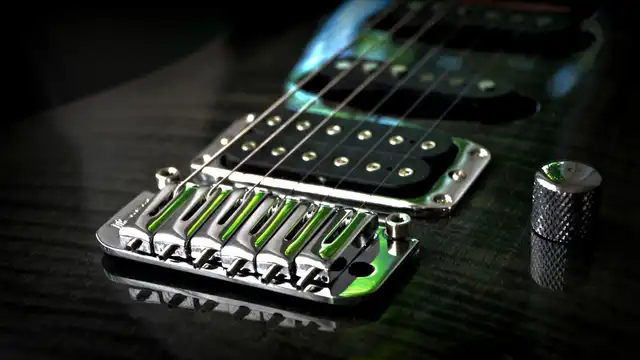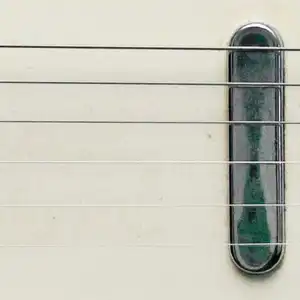5 Reasons Why Guitar Strings Break


We've all been there...
 Your guitar plays fine for days—even weeks—and then you get to the big show, it's almost time for your solo, and your string breaks. It sucks.
The good news is, by learning a bit about why guitar strings break, we can learn how to prevent it. And in most cases, the problem can be diagnosed by taking a close look at where the string is breaking and making a few small adjustments or improvements to your setup, to ensure it doesn't keep happening.
Sidenote: As a guitar string company ourselves, there's nothing more frustrating than having someone write in to explain that they've had five straight High E strings break right at the bridge, and asking what's wrong with our strings... In most cases, strings break because they encountered something sharp on the guitar—and this is especially true when your strings are consistently breaking at the same place.
Your guitar plays fine for days—even weeks—and then you get to the big show, it's almost time for your solo, and your string breaks. It sucks.
The good news is, by learning a bit about why guitar strings break, we can learn how to prevent it. And in most cases, the problem can be diagnosed by taking a close look at where the string is breaking and making a few small adjustments or improvements to your setup, to ensure it doesn't keep happening.
Sidenote: As a guitar string company ourselves, there's nothing more frustrating than having someone write in to explain that they've had five straight High E strings break right at the bridge, and asking what's wrong with our strings... In most cases, strings break because they encountered something sharp on the guitar—and this is especially true when your strings are consistently breaking at the same place.
1. Guitar strings break because the bridge is too sharp
 Like I mentioned in the sidenote up above—does it seem like it's always the same string breaking, over and over? Take a look at where the string is breaking. If it seems to always happen a few inches from the ball end, your bridge might be to blame.
Of all the places where guitar strings can break, the bridge is undoubtedly the most common location. Tune-o-matic bridges are especially unforgiving when it comes to strings. Sometimes, especially with new guitars, the saddles are just too sharp.
If this is the case, take a small file or a bit of sandpaper to the crease in the bridge where the string lies and see if you can smooth it out a bit. If you don't have any on hand, another option is to take a used string and rub it over the bridge slot a bit to try and smooth things out—though admittedly this doesn't work quite as well as the sandpaper/file option.
Like I mentioned in the sidenote up above—does it seem like it's always the same string breaking, over and over? Take a look at where the string is breaking. If it seems to always happen a few inches from the ball end, your bridge might be to blame.
Of all the places where guitar strings can break, the bridge is undoubtedly the most common location. Tune-o-matic bridges are especially unforgiving when it comes to strings. Sometimes, especially with new guitars, the saddles are just too sharp.
If this is the case, take a small file or a bit of sandpaper to the crease in the bridge where the string lies and see if you can smooth it out a bit. If you don't have any on hand, another option is to take a used string and rub it over the bridge slot a bit to try and smooth things out—though admittedly this doesn't work quite as well as the sandpaper/file option.
2. Guitar strings break because of rough fret edges
 Maybe it isn't the same string that always breaks, but does it always seem to happen in the same spot? If that spot is anywhere up near the neck, a rough fret edge may be to blame for your broken string woes.
If your strings are breaking mid-way between the bridge and the neck, take a close look at your frets and see if there are any burred edges. Even if you can't see anything on your frets, you may just want to take note of where your strings are breaking. Simply take the end of your freshly broken string and stretch it out from the bridge to see where the break occured.
Just as above, if your frets seem like they might be to blame, try to smooth them out with a bit of sand paper or a file. Since most guitar frets are Nickel Silver, they're soft enough for you to get the job done without exerting too much force.
Maybe it isn't the same string that always breaks, but does it always seem to happen in the same spot? If that spot is anywhere up near the neck, a rough fret edge may be to blame for your broken string woes.
If your strings are breaking mid-way between the bridge and the neck, take a close look at your frets and see if there are any burred edges. Even if you can't see anything on your frets, you may just want to take note of where your strings are breaking. Simply take the end of your freshly broken string and stretch it out from the bridge to see where the break occured.
Just as above, if your frets seem like they might be to blame, try to smooth them out with a bit of sand paper or a file. Since most guitar frets are Nickel Silver, they're soft enough for you to get the job done without exerting too much force.
3. Guitar strings break because the nut is dirty or worn
 If your strings are breaking near the nut, that should be a red flag that something is wrong up top. Usually there are two instances where a nut can contribute to string breakage: dirt gathering in the slot of the nut, or a nut that has been worn by heavier strings.
It's always a good idea to clean the nut when restringing to remove any dirt or grime that might have settled in. Nut sauce or lubricant can also be a really good option to employ during string changes and has the added benefit of improving your tuning stability, since there's nothing for your strings to catch on there in the nut.
If you suspect that the nut may be contributing to your guitar strings breaking, it might also be a good idea to file it down a bit to remove any sharp edges that might have been created by switching between string gauges. Again, very fine sandpaper or a small file are the best tools for the job.
If your strings are breaking near the nut, that should be a red flag that something is wrong up top. Usually there are two instances where a nut can contribute to string breakage: dirt gathering in the slot of the nut, or a nut that has been worn by heavier strings.
It's always a good idea to clean the nut when restringing to remove any dirt or grime that might have settled in. Nut sauce or lubricant can also be a really good option to employ during string changes and has the added benefit of improving your tuning stability, since there's nothing for your strings to catch on there in the nut.
If you suspect that the nut may be contributing to your guitar strings breaking, it might also be a good idea to file it down a bit to remove any sharp edges that might have been created by switching between string gauges. Again, very fine sandpaper or a small file are the best tools for the job.
4. Guitar strings break because of burred tuning posts
 If your guitar strings are always breaking right near the tuning posts—you guessed it—your tuning posts might be to blame.
Rarely, guitars come from the factory with burred edges on the tuning posts that can cause breakage, even on a brand new guitar. This doesn't mean that burred edges can't also occur over time of course, as that certainly can happen as well.
The best technique we've found is to use an old wound string (preferably a thick one) and work it through the string hole in a circular motion against the edges to smooth out any offending burrs.
If your guitar strings are always breaking right near the tuning posts—you guessed it—your tuning posts might be to blame.
Rarely, guitars come from the factory with burred edges on the tuning posts that can cause breakage, even on a brand new guitar. This doesn't mean that burred edges can't also occur over time of course, as that certainly can happen as well.
The best technique we've found is to use an old wound string (preferably a thick one) and work it through the string hole in a circular motion against the edges to smooth out any offending burrs.
5. Guitar strings break because you're using the wrong strings
 Guitar strings are made to hold up to a lot of tension, so in most cases, repeat string breakage is due to a mechanical problem with the guitar itself. But if you are using standard strings for an alternate tuning, forcing some strings to hold higher tensions than they were designed for, this could easily cause a string to break.
The best solution is to always use the right strings for the job. Our balanced guitar string sets are a great choice if you're playing in standard tuning—but if you're playing in an open tuning it's best to get a custom set of strings that lets you keep tension even between the individual strings.
Guitar strings are made to hold up to a lot of tension, so in most cases, repeat string breakage is due to a mechanical problem with the guitar itself. But if you are using standard strings for an alternate tuning, forcing some strings to hold higher tensions than they were designed for, this could easily cause a string to break.
The best solution is to always use the right strings for the job. Our balanced guitar string sets are a great choice if you're playing in standard tuning—but if you're playing in an open tuning it's best to get a custom set of strings that lets you keep tension even between the individual strings.
We made a whole video talking a bit more in depth about these difference causes of breakage, and more importantly, what you can do to fix them:
Other Posts you may like

Guitar Strings Order: How the Guitar is Tuned and Why

Two Handed Tapping: Our Top 8 Tappers of All Time

Which Guitar Strings Wear Your Fret Wire Down More?

What is Nashville Tuning? Its History, Best Guitar Strings & Uses

Guitar Scale Length Explained: String Tension & Playability

What Guitar Strings I Used To Play...
0 Responses
Leave a Reply
Your email address will not be published. Required fields are marked *

